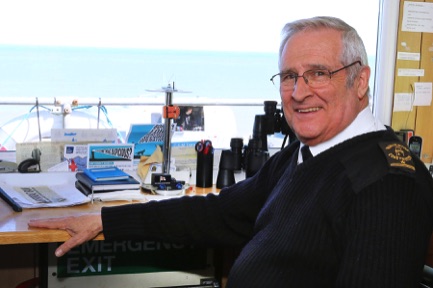Vital eyes watching over us
THEY sit in their lookout post high above the beach, their binoculars scanning the sea as they listen to the chatter of marine traffic sailing past.
But who are the vital eyes watching over sailors, fishermen and visitors to the Winterton coast and what are they looking out for?
Their Coast Watch post is part of the Sea Safety Group, which has stations on the east coast, stretching from Dundee in Scotland to Pakefield in Suffolk keeping a visual watch on coastal waters, monitoring distress channels and reporting to the Coastguard. They are all volunteers, and lives have been saved because of the work they do.
Like most of his team controller Roger Rolph doesn’t have marine background. “My grandad was 25 years in the Royal Navy but I get seasick if I go on a ferry,” said the ex-insurance broker.
Among the watchkeepers there are two ex-police officers, an air traffic controller, a chef, two tour bus drivers, a physicist, a retired head teacher, a builder and a man who invented an electronic tag used to monitor criminals.
“For most guys it is a complete change from what they have been doing for the last God knows how many years. We come in, shut the door and we’re on our own. We know our responsibilities. We’re not there to relax, we’re there to do a job.”
And they know their role is important. “A lot of coastguard stations have shut down,” said Roger. “When Covid came in last year we were closed for four months. When the second lockdown came in volunteers were excluded from it. The Coastguard realised they had lost their eyes and ears.”
Seven hours a day, seven days a week – apart from when the weather conditions make it too risky to staff the post – they watch, not just over shipping, but swimmers, people on the beach and even wildlife.
"It can be quite interesting at times because of what people get up to,” said Roger.
One memorable incident in recent years involved a sloop with one crewmember that suddenly swung round. The sails were flapping and there was no sign of movement onboard. The watchkeeper raised the alarm and the lifeboat was sent.
The rescuers discovered the man had been hit on the head by the boom and suffered a heart attack. His life was saved.
The legacy of the Second World War also surfaces from time to time in the form of ordnance, including mortar rounds - often uncovered by metal detectorists.
One visitor said he found one in the dunes and was thinking of taking it home. He left it behind and bomb disposal experts dealt with it.
Then there was the man who found a grenade. “He was throwing it up in the air and catching it,” said Roger. The watchkeeper was an ex-sapper who spotted it was still live.
A dog died when a yacht hit a tree trunk in the water. There were two adults and a child onboard but no radio, only a mobile phone. The holed vessel sank. They were saved but their dog had been tied up and went down with it.
When Coast Watch began its operation in Winterton it took over the old coastguard station. Erosion meant it had to be closed and demolished in the early 2000s. That the current lookout post exists is down to former controller Alan McMurchie.
With the help of volunteers and supporters he bought the units and built the new tower, which stands just inside the gates of the car park. Roger took over as controller after Alan died in 2016.
A plaque in memory of the stalwart, who featured in the Vital Eyes documentary (https://bit.ly/2RCqz3n), can been seen at the foot of the tower.
The group relies on donations from the public which can be made at the station or find it on Facebook at facebook.com/WOSCW
© All content copyright 2021
winterton-on-sea
